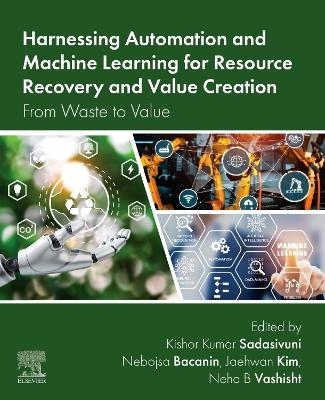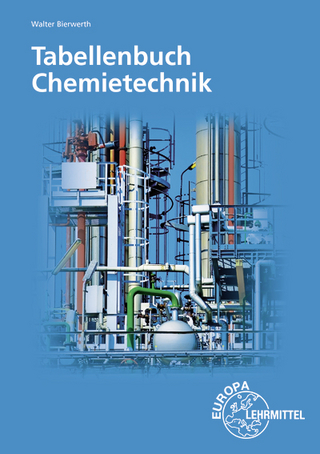
Harnessing Automation and Machine Learning for Resource Recovery and Value Creation
Elsevier - Health Sciences Division (Verlag)
978-0-443-27374-2 (ISBN)
- Noch nicht erschienen (ca. März 2025)
- Versandkostenfrei
- Auch auf Rechnung
- Artikel merken
Dr. Kishor Kumar Sadasivuni is currently working as a Research Assistant Professor and the group leader of SmartNanoSolutions at Center for Advanced Materials, Qatar University. Dr. Kishor’s research has its roots from the analytical chemistry he mastered during his Master’s degree in Andhra University, India. He received his Ph.D. in Materials Science and Engineering from University of South Brittany at Lorient, France in 2012 under the supervision of the Prof. Yves Grohens and Prof. Sabu Thomas. He has to his credit a vast experience of postdoctoral research as he has been to this position firstly at the Inha University at South Korea (Professor Jeahwan Kim Supervisor, 2014) and then two times at Qatar University (Professor Mariam Al-Madeed,2015 and Dr. John-John Cabibihan,2017). He was appointed to the Center for Advanced Materials at Qatar University in 2018 as a Research Associate from which he has been promoted to his present designation as Research assistant Professor in June 2021. He has been included in the world’s top 2 % scientists according to a list compiled by Stanford University in the year 2019 and for this he was recently honored by the QU. He has enormous knowledge and valuable experience in his field owing to over 12 years of active research research experience of 12 years. Dr. Kishor has more than 250 research articles published in international peer reviewed journals with a total citation of 4850 and h-index 37. He is also the author of 20 book chapters and the editor of 8 books. His books were included in Springer Top 25 e-book download of the year 2020. Some of Dr. Kishor’s inventions are protected by 2 US patents and 2 Indian patents and presently 5 patent disclosures have been submitted by him. He is a group leader and is presently the lead principal investigator for 11 research projects, covering the NPRP, UREP, IRCC grants of Qatar National Research Fund and the Qatar University. He is also involved in other three research grants as the principal investigator, summarizing a total grant amount of 3M$. Dr. Kishor is a team player and has collaborated actively with researchers (more than 450 co-authors as evident from the Scopus data) in several disciplines of computer science, biomedical sciences, industrial engineering, and electrical engineering from all over the world (USA, France, South Korea, Oman, Spain, Italy, Australia, Malaysia). Dr. Kishor’s achievements have been recognized by several awards such as Tyre & Rubber Industry Leadership Acknowledgement Awards (TRILA); Young Research Scholar of the Year 2017. Dr. Nebojsa Bacanin received his Ph.D. degrees from Faculty of Mathematics, University of Belgrade in 2015 (study program Computer Science, average grade 10,00). He was the vice-dean of the Graduate School of Computer Science and Faculity of Informatics and Computing in Belgrade, Serbia. He currently works as a Full Professor and as a Vice-Rector for Scientific Research at Singidunum University. He is involved in scientific research in the field of computer science and his specialty includes artificial intelligence, machine learning, deep learning, stochastic optimization algorithms, swarm intelligence, soft-computing, optimization and modeling, image processing, computer vision and cloud and distributed computing. He actively works in the domain of novel and prospective research field, hybrid methods between machine learning and metaheuristics, where metaheuristics are applied for addressing non-deterministic polynomial hard (NP-hard) challenges from machine learning domain such as hyper-parameters optimization (tuning), training and feature selection. Besides improving machine learning/deep learning models for tackling various practical tasks for classification and regression, his research also involves optimized deep learning models for univariate and multivariate time-series forecasting. Moreover, he is an expert from the area of metaheuristics, and he has been actively doing research in enhancing swarm intelligence, as well as other types of metaheuristics, by incorporating minor changes (e.g., modification in exploitation/exploration expressions, parameters’ adjustments, etc.) and/or major modifications by performing hybridization with other methods (e.g., low-level and high-level hybrid metaheuristics methods). He has been applying his methods to wide variety of practical research areas, e.g., cloud computing scheduling, wireless sensor networks (WSNs) localization, coverage and energy consumption, X-ray images classification, stock price forecasting, portfolio optimization, as well as many others. Jaehwan Kim serves as an Inha Fellow Professor at the Department of Mechanical Engineering at Inha University, Korea. He is also designated as Director of CRC for NanoCellulose Future Composites. Dr. Kim is a Fellow of The Korean Academy of Science and Technology, the National Academy of Engineering of Korea, and the Institute of Physics. He is an Associate Editor of Smart Materials and Structure as well as Smart Nanosystems in Engineering and Medicine and Editor of International Journal of Precision Manufacturing and Engineering, Helyon and Actuators. He has been the Director of Creative Research Center for EAPap Actuator funded by the National Research Foundation of Korea (NRF). Recently, he started the Creative Research Center for Nanocellulose Future Composites, sponsored by NRF. His research interests are smart materials, structures and devices, biomaterial-based smart materials, cellulose, electroactive polymers, power harvesting, biomimetic actuators, biosensors, tactile sensors, and flexible electronics. He has published more than 320 journal papers, presented 360 international conference papers, and filed more than 40 patents. Dr. Neha Vashisht is working as Researcher at as a researcher at Smart Nano Solution group, Centre for Advanced materials (CAM), Qatar University. She received her PhD in 2017 from Department of Basic & Applied Sciences, Guru Gobind Singh Indraprastha University of Science and Technology, New Delhi, India. During her Ph.D, she worked on Synthesis and Characterization of Plasmonic noble metal-Tin oxide hybrid nanocomposites for sensing applications. She has many research publications in leading scientific research journals with good impact factors. Her area of interest are synthesis and characterization of new smart hybrid materials, nanocomposites, their modifications, and optics. She has actively participated in and presented her research work at several international conferences and seminars.
1. Introduction to innovative Technologies for Waste-to-Energy Conversion using automation and machine learning
2. Basics of Machine learning
3. Basics of Automation
4. Waste classification into plastics, industrial, domestic, and agriculture waste
5. Plastics recycling and the automation role in the recycling process
6. Artificial intelligence for reutilizing the Plastics
7. Handling Metals waste to Salvage with Automation
8. Machine learning: A better means for Metal waste to reprocess
9. Automation in the recycling of Industrial waste
10. Machine learning in Industrial Waste to value added
11. Waste to Value Added: Role of automation in Organic waste
12. Impact of Artificial Intelligence for the recycling of Organic waste
13. Future of Agriculture: Automated vertical farming
14. Agriculture: The Next Machine-Learning Frontier
15. Recycling robots to tackle electrical waste
16. Machine learning for sustainable development in electronics
17. Automated Sorting of Recyclable Domestic waste
18. Machine learning for recycling domestic waste
19. Future aspects of Machine learning/automation for the waste management
| Erscheint lt. Verlag | 1.3.2025 |
|---|---|
| Verlagsort | Philadelphia |
| Sprache | englisch |
| Maße | 191 x 235 mm |
| Themenwelt | Naturwissenschaften ► Chemie ► Technische Chemie |
| Technik | |
| ISBN-10 | 0-443-27374-X / 044327374X |
| ISBN-13 | 978-0-443-27374-2 / 9780443273742 |
| Zustand | Neuware |
| Haben Sie eine Frage zum Produkt? |
aus dem Bereich


